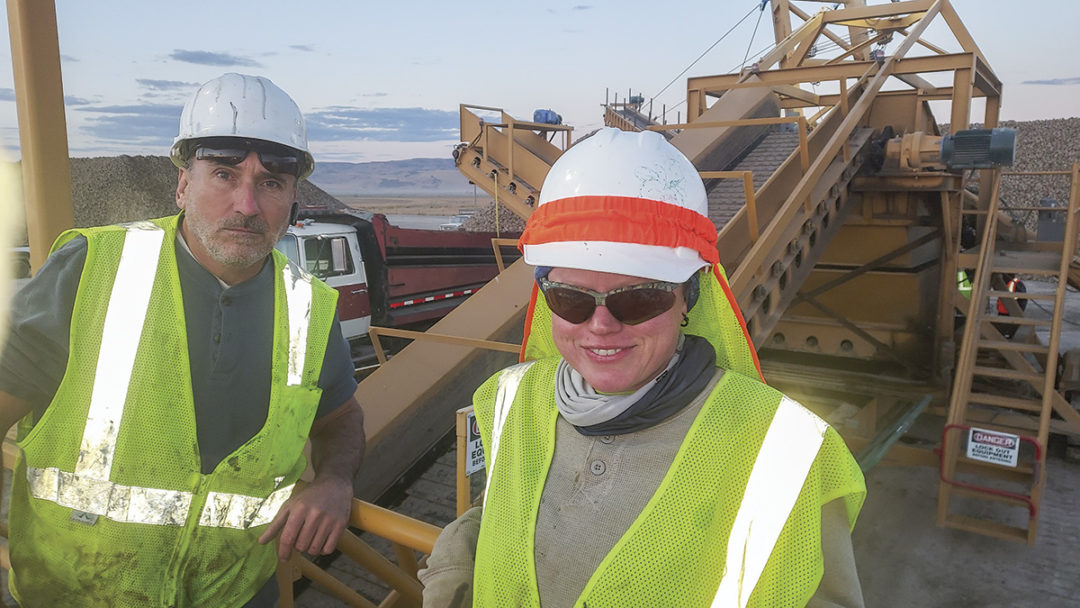It’s a thing – work campers. It’s living in an RV and traveling the country. Some travel for pleasure and relaxation (obviously, the ones who can afford to do so), and many travel because housing simply became unaffordable and this was one solution, or because they like variety and seeing new places. The second set of traveler moves from seasonal job to seasonal job, spending a few weeks or a few months at a time in different parts of the country performing different jobs.
Three years ago, Amalgamated Sugar Company began advertising work opportunities to work campers, to fill jobs during harvest. “Labor is always a tough deal for us, typically during harvest,” says Kody Bingham, senior agriculturalist. Bingham’s responsibilities include working with growers through every aspect of contracting, growing and harvesting in the Mini-Cassia area, as well as managing beet piles during winter. Bingham says that by Sept. 20, 2022, they still had 50 open jobs to fill.
“We started advertising everywhere,” Bingham says of their push to hire from the work campers’ groups three years ago. Through social media and websites dedicated to this workforce (i.e., workersonwheels.com), they saw results quickly. “Our timeline works really well for folks looking to head to the coast for winter,” Bingham says. “Our temperatures are usually mild in the fall, and we have work from the first of September through the end of October. It’s a nice stopover for folks.”
And it’s a workforce Bingham quickly learned to appreciate. “My favorite part is getting to meet new people. Generally, they’re here to work and are hard workers. They’re used to traveling and they’re not afraid to jump right in and get started. It’s interesting for me to hear about their backgrounds, where they come from and what their plans for the future are.”
The sugar company pays the RV campsite fee (except for utilities), an hourly wage with overtime and, if the workers are required to travel to a further piling site, the company also pays mileage. They fill positions from piling-ground foreman, piling operator, quality sample takers and scale positions to equipment operators.
 Early sugarbeets make their way from the truck to the piler in the Mini-Cassia area. Photo by Nathan Holder.
Early sugarbeets make their way from the truck to the piler in the Mini-Cassia area. Photo by Nathan Holder.
“We put them through the hiring process and give them safety and leadership background training,” Bingham says. “Safety is our number one priority during harvest, so everyone attends a two-hour safety meeting with videos of piling grounds and actual work areas, for real-world application.”
“We’re now seeing some return workers,” Bingham says. “We rely heavily on the returners who have a good understanding of our operation. With that comes referred work campers, and they’re some of the best [seasonal help] we can get. After potato season, about Oct. 1, we can pick up potato workers too, and then generally we’re in pretty good shape.”
Bingham says he’d like to see the number of work campers applying at least double every year. “They’re here to work. They’re not job-hopping, in that sense; this is their living – going to different jobs. I’ve learned that the work campers are here to work – they show up every day.”
Experienced work campers Nathan Holder and Anjuli Wilkinson are two of those workers who show up every day during sugarbeet season at Amalgamated Sugar Company’s Mini-Cassia piling sites. Six years ago, what began as a summer gig at national parks and a winter gig at a ski resort turned into a year-round trek with sugarbeet season filling the gap – sugarbeets in North Dakota, that is.
“And it was cold,” Holder says. Crews ran around the clock – two 12-hour shifts. This compressed the harvest into about 14 days, if the weather held. “I was a station foreman there,” Holder says, “and I’d have a near heart attack sometimes watching those long-bed dump trucks sway in the high wind and wondering if they’d make it.” It was a short season, and they’d receive bonuses if they stayed through to the end of harvest, but fuel costs were expensive to get there and come back to Utah for the winter, and sometimes the roads out of North Dakota would close for winter weather before they could get out.
By then, Holder and Wilkinson discovered Idaho as a possible sugarbeet harvest opportunity to fill their seasonal gap. “The weather is more temperate, it’s closer to our family in Utah where we winter, and we like it here,” Holder says. He works as a station manager at the Kenyon receiving site in Cassia County, while Wilkinson works as a piler operator.
“It doesn’t take long for everyone to know their job, so the site pretty much runs itself now,” Holder says. “My job is making sure they have what they need and make sure they’re not complacent. I first try to make everyone comfortable because fear [of not knowing how to do a job] equals mistakes, and mistakes equal injuries and accidents. Especially for a greenhorn, it can be overwhelming. It’s pretty fast-paced.”
“It’s a skill,” Wilkinson says. “Paying attention, staying awake and aware for hours on end while doing the same job over and over. It may be super simple or super easy, but if you mess up people can die. So it’s a skill to stay focused and do it well. It’s actually a good meditation process – learning to stay focused and remain focused. You have to learn that – otherwise, you’re dangerous.”
 Anjuli Wilkinson (right) and the piling crew work at the Kenyon site as late harvest ramps up. Photo by Nathan Holder.
Anjuli Wilkinson (right) and the piling crew work at the Kenyon site as late harvest ramps up. Photo by Nathan Holder.
The sugarbeet harvest typically runs 14- to 16-hour shifts for the main harvest. The early beets run 10- to 12-hour-per-day shifts.
Work camping isn’t for everyone, on that Holder and Wilkinson agree. Some of the downsides to working in the agricultural harvests include weather changes that stop harvest. “Weather can be a dealbreaker,” Holder says. “If you’re traveling from Texas, Florida or Georgia and have those related expenses, and then harvest is shut down when you get there so no money is coming in for a few weeks, things can get pretty slim. If those weather delays catch you by surprise, it’ll hurt.”
Wilkinson says, “And pets … they can be a dealbreaker. Work camping isn’t great for pets because the work may be short term, but it’s usually pretty intense. If you keep pets, you better plan around them because you won’t have the time and attention they need.”
On the upside, work camping is a terrific fit for Holder and Wilkinson. Holder says, “I didn’t enjoy learning until late in life. Now I love learning new stuff. We’ve learned vehicle mechanics over last winter. We enjoy these things – experiencing new things. And every year gets better.” He adds, “And the traveling can be addictive, but for me it’s learning new skills that keeps me interested,” he says.
Wilkinson says she enjoys the challenge, “ … the intensity, the all-in. You get the job done and figure things out on the fly. Then when it’s over, it’s over and you have a little spending money.” And they both enjoy meeting different people. “Besides,” Wilkinson says, “My mom loves it when we go to new places where she can come visit us. It’s her vacation and her excuse to go places she wouldn’t otherwise go.”
“For sure, it’s worth time and effort [to hire work campers],” Bingham says. “Idaho needs these temporary workers. The season isn’t long enough for people to quit their full-time jobs and work with us. And I enjoy it because it’s interesting to hear about their backgrounds and where they come from and their plans for the future. And it’s been extremely helpful to get good people who are hard workers and will work seasonal jobs. Their lifestyle works well for the ag industry.”


.jpg?t=1687979285&width=640)





